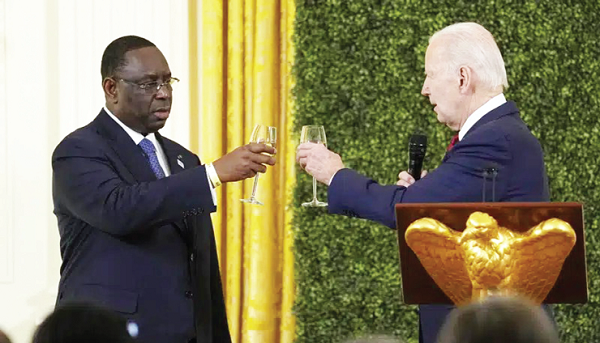
US seeks to deepen trade, political ties with Africa
The Biden administration convened a United States-Africa summit in Washington this week after having announced a new strategy for the continent in the summer to restore lost trust and credibility in their relationship.
The three-day gathering brought together leaders from 49 African nations and the African Union (AU) for high-level talks to regain the confidence of African leaders and convince them that the US offered a better option to African partners.
Advertisement
Ahead of the summit, President Biden's administration has mentioned a potential financial envelope of $55 billion in Africa over the next three years on “a wide range of sectors to tackle the core challenges bedevilling the continent.
Years of neglect
After years of neglect, the Biden administration now says it wants to help with Africa’s mounting challenges and the US Department of Defence list includes “political instability, armed groups, democratic backsliding, pandemics, environmental degradation and climate change”.
The new scramble for Africa is part of President Joe Biden’s effort to shore up dwindling American influence in various parts of the world from Latin America to the Indo-Pacific through Africa and the Middle East, where other powers, notably its nemesis, China, are making considerable inroads, economically and strategically.
Beijing’s success in Africa
Beijing’s success in Africa has been of particular annoyance to Washington. During the past 20 years, China has grown its influence on the continent at the expense of all Western powers, including the former colonial powers, Britain and France.
China’s direct state involvement in Africa, through loans and mega infrastructural and technological projects from ports to power stations has made it harder for others such as the United States to compete.
The investment fervour may cool off as more governments struggle with paying back their loans following the pandemic creating the risk of a Chinese takeover of their national assets such as ports and airports. But despite COVID-19 and its related supply-chain challenges, bilateral trade between China and Africa had in fact risen by 35 per cent from 2020 to $254bn in 2021, due mainly to Chinese exports.
Biden’s wake-up call
If Biden needed a wake-up call, it may have come earlier this year when, following the Russian invasion of Ukraine, the US failed to enlist the support of African nations at the UN, where they represent more than a quarter of the General Assembly’s members.
When voting on a draft resolution to freeze Russia’s membership at the UN Human Rights Council, only 10 out of 54 African nations voted in favour, nine voted against, and the rest either abstained or did not show up for the vote. Worse, South Africa, among America’s leading partners on the continent, championed the abstention drive.
Now the Biden administration says it wants to resume the work of the Obama administration, which held the first US-Africa summit in 2014, by pursuing an African agenda free of the usual paternalism and based on mutual interest and mutual respect. It pledges to listen to instead of lecturing its African partners and to pursue sustainable policies that are in the best interest of the continent.
African Nations
US officials have indicated that they will not ask African nations to choose sides, but that the US strives to be the continent’s “partner of choice”. That is smart, considering that many would probably choose China.
But America continues to command goodwill on the continent, as, polling by Afrobarometer, shows 60 per cent of Africans believe the US has had a positive economic and political influence on their country, just behind China (63 per cent) but far ahead of Russia (35 per cent) and the former colonial powers (46 per cent).
This also indicates that Africans do not see their foreign relationships as a zero-sum game, and do not want to become dependent on any foreign power. They have gone hybrid, choosing and mixing from among the various outside parties, be it the US, UK, EU, China, Russia, France, India or Turkey.
Convening second summit
To be a partner of choice, the US must first commit to the relationship at least as the Chinese have done. But the US has waited eight years before convening a second summit, with little follow-up in between. Instead, Africa had to put up with former President Donald Trump’s racism, no less his reported 2018 remark describing African nations as “shithole countries”.
After years of neglect, the Biden administration now says it wants to help with Africa’s mounting challenges. The US Department of Defence list includes “political instability, armed groups, democratic backsliding, pandemics, environmental degradation and climate change”. The continent is also plagued with poverty, insecurity, poor governance and frustrated youth with no horizon to speak of.
Pressing challenges
In response to these pressing challenges, the US Department of State has articulated a new Africa strategy that steers away from too much talk about security and combating “terrorism” to address the root causes of instability and violence, such as fostering economic engagement, promoting food security, and promoting education and youth leadership.
That is why Washington must take concrete measures, such as increasing investments in the private and public sectors, rewarding better governance, supporting the African Union’s inclusion in the G20, and committing to another US-Africa summit in the next couple of years, to follow up on this week’s decisions.



